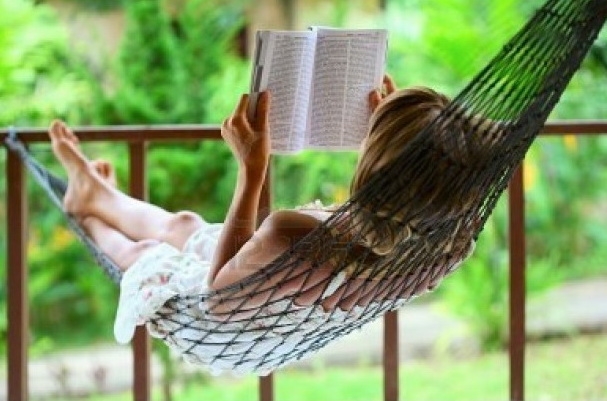Problems due to health security following the reopening of casinos in the United States at this week’s Sunday Readings.
The opening of casinos in the United States on June 4 allowed the resumption of traditional gambling in what is called the new normal.
This new normality provides for strict sets of health security measures, designed not to create problems and to help stop the spread of covid-19.
The opening of American casinos was watched by the representatives of CDC Consulting, one of the most important companies in the field of gambling.
They monitored the opening of 55 locations in 17 US states and noted numerous problems.
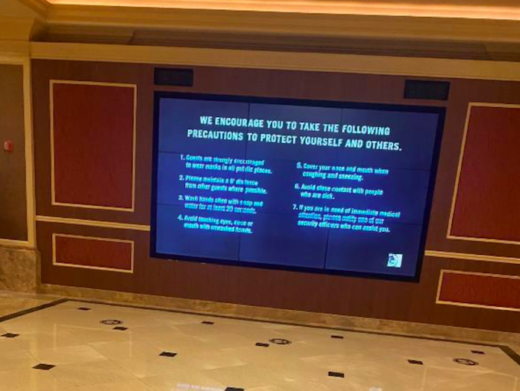
Casinos put safety first, but many guests ignore protocols
Problems as:
– Crowded elevators;
– Too many gamblers surrounding a craps table;
– Slot players side by side;
are very common.
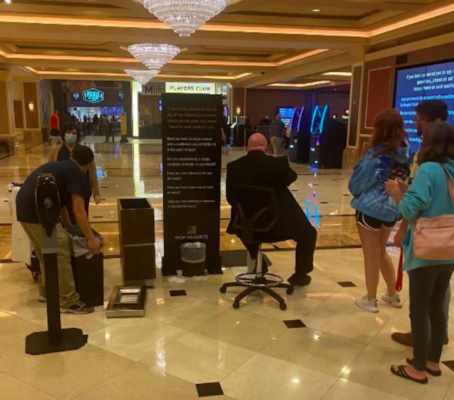
Temperature checks for some patrons, but not others.
The rollout of state-mandated health and safety rules varies by property. And, in many cases, guests are not socially distancing.
“You can put all the stickers down that you want to keep people 6 feet away from each other and only put four people in an elevator … that’s not happening,” said Greg Mullen, vice president of CDC Consulting, which has had people attend 55 casino reopenings in 17 states.
The rules
The state Gaming Control Board required a series of social distancing measures, including limited seating at table games, increased spacing between restaurant tables, and increased distances between slot players on the casino floor. And it required temperature checks of hotel guests, but not casino players.
“That said, compliance is the goal to ensuring the effectiveness of these measures. We expect gaming licensees to comply with our policies, which has a social distancing section, and to comply with their own plans they submitted to the board to ensure the safety and well-being of their employees and guests.”
Casino companies say they have signage related to social distancing, are trying to enforce directives and most have initiated additional training for employees.
“We deployed a trained team of more than 50 employees on Friday, Saturday and Sunday,” said Michael Weaver, a spokesman for Wynn Resorts Ltd. “Their specific role is to approach guests who appear to have briefly forgotten about the importance of physical distancing and remind them of it in a warm and friendly way.”

Boyd Gaming, a major locals casino company that also has properties in downtown Las Vegas, also is working with its employees.
“Upon returning to work, every Boyd Gaming team member is required to take extensive training on our health and safety protocols, including social distancing requirements we are enforcing throughout our properties,” spokesman David Strow said. Boyd employees are also tasked with reminding guests to socially distance, he said.
Brian Ahearn of MGM Resorts International also said workers have received training and continued reinforcement of social distancing policies and “we work to keep this policy top of mind for both employees and guests, and our employees will continue doing their best to remind guests of this guidance whenever possible.”
The visual cues on the floors also are deemed important at Las Vegas Sands Corp.’s The Venetian, and for Caesars Entertainment.
Keith Salwoski, a spokesman for The Venetian, said the resort has installed 1,000 physical distancing floor markers.
Caesars spokesman Rich Broome said there are “ample and easily distinguishable visual cues” for social distancing as well as encouragement by employees.
Gaps
The Review-Journal’s team of reporters covering opening day observed several instances of social distancing gone wrong. At Caesars Palace, for example, elevators at parking garages and for hotel rooms were clearly marked with signs asking that elevator capacity be limited to four people. But that didn’t stop people from jumping aboard when the elevator stopped at their floor. There was no hotel personnel to enforce the requirement.
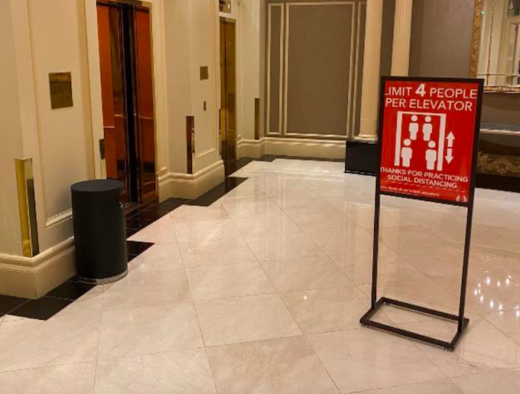
At Red Rock Resort, a gambler made a call to the Control Board, which dispatched an agent when a group of people surrounded a craps table and pushed the number of participants over the stipulated limit of six players. The Control Board had no comment on the incident or whether disciplinary action would occur, and Red Rock did not return a request for comment.
The Control Board required temperature checks for hotel guests but not casino players or employees — although some properties check everybody. The temperature limit is 100.4 degrees. The Gaming Control Board also directed additional training for employees to spot potential COVID-19 cases and to wash their hands frequently for at least 20 seconds.
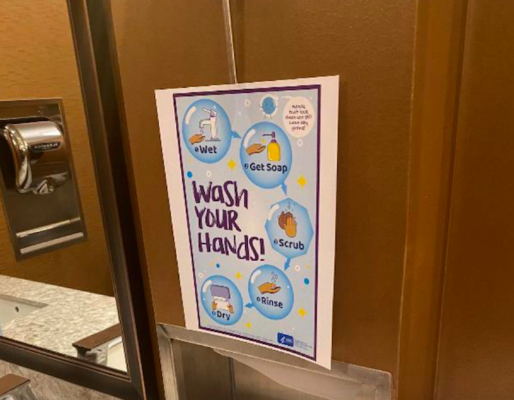
Dan Doud of Irvine, California, asked in a letter to the Control Board on Wednesday, “Shouldn’t the patrons be tested too?”
“Generally it would seem that all foot traffic within a facility would be screened consistently in order to protect everyone equally,” his letter said. “yet there seems to be a distinction in some of the guidelines that only employees operating within a facility should or would be subjected to thermal screening for potential infection. This seems pretty inconsistent, and many businesses are intending to rely upon the guidelines as they are published.”
Enforcement
Some industry observers, like Mullen, say encouraging social distancing is not enough.

“People are not standing there; they’re not enforcing it. A couple of properties we went to back east for the first few days had an actual employee stand there wiping down the buttons (in elevators) and enforcing the four-person rule. Now that things have started to open up, that’s gone,” Mullen said.
Mullen said social distancing procedures are just a publicity stunt.
“We don’t know who they’re trying to appease, the (Centers for Disease Control and Prevention), is it gaming (regulators) or is it just the overall perception? Because you put stickers down that say ‘Limit four to an elevator,’ when no one’s watching that, no one’s enforcing that.”
Greg Chase, founder and CEO of Las Vegas-based Experience Strategy Associates, said in his observations last weekend, the locals properties weren’t doing as good a job as their Strip counterparts in terms of enforcing social distancing measures.
Chase said that at some locals properties every slot machine was activated, but chairs in front of them were removed.
One of the problems was: “There was nothing preventing people from moving the chairs around and putting people in close contact with each other,” he said.

Chase said that when he reviewed the Gaming Control Board health and safety standards, he was surprised to see no references to how casino chips should be cleaned and who is allowed to touch cards and this can be one of the problems.
“The greater theme here is the inconsistency,” Chase said. “There’s too much gray area that ultimately will cause concern.”
Culture shift
Billy Vassiliadis, CEO of R&R Partners marketing firm, advertising consultant to the Las Vegas Convention and Visitors Authority, said many visitors from outside the market have come to Las Vegas to escape the grind of rules put before them in their home states.
“The reality is that the culture is shifting away from fear of COVID-19 even as the numbers are going up,” Vassiliadis said during a Tuesday LVCVA meeting.
“Between the lockdown and the amount of time people were in, I think there’s some sense of ‘I can’t live like this; I’m going to take my chances’ that was going on out there.”





